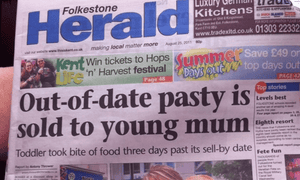
Here are some local newspaper articles culled from both websites and newsprint editions: “13 things you’ll understand if you are a Southern rail passenger” (Surrey Mirror); “9 secrets you won’t have known about Croydon’s old Blockbuster video stores” (Croydon Advertiser); “Out-of-date pasty is sold to young mum” (Folkestone Herald); “Entire KFC feast of fried chicken breasts and fries strewn across Cheltenham pavement this morning” and “Is this the biggest chip in Gloucestershire?” (both Gloucestershire Echo).
They are cited by journalism lecturer Sean Dodson in a piece for The Conversation, wittily headlined “Four reasons why listicles and clickbait are killing real journalism”. In his polemic, Dodson wrote:
Discarded fast food and stale pasties are simply not news as generations of reporters have understood it.
There is widespread academic consensus – a solitary piece of litter or a big chip or a stale pasty does not conform with any of the news values codified by either Galtung and Ruge or Harcup and O’Neill, whose work on news values is generally accepted as the gold standard for journalists.
Can we expect more? You bet. Regionals across the land are using ever __more content written by amateurs to fill newspapers left chronically understaffed by rounds of job losses.
He continued: “Fewer journalists, fewer scoops, fewer hard questions, less topicality and weaker attribution. It all contributes to the falling credibility of Britain’s regional papers.
“The idea of a critical or rational press so clearly defined by Jurgen Habermas cannot, surely, be consistent with editorial policy that counts generating clickbait as part of its schedule.
“And so, we see __more listicles, more user-generated content and more stories without any recognisable news value.”
Dodson, a lecturer at Leeds Beckett university, approvingly quotes the Guardian’s editor, Katharine Viner, who criticised a media business model based on “chasing down cheap clicks at the expense of accuracy and veracity”.
She argued that “junk-food news” and “chasing page views in the vain hope of attracting clicks and advertising” undermine the reason that news organisations exist: “to find things out and tell readers the truth - to report, report, report”.
Does the publisher of the titles who purveyed that nonsense above, Trinity Mirror, share that view? Dodson thinks not.
He points out that Trinity Mirror cut jobs after it recently “transformed” its titles into “digitally-led news publications” and the surviving staff were ordered to produce live blogs – everything from fascist marches to the opening of a branch of KFC.
Other publishers have sought copy for free from non-journalists. Johnston Press, in relaunching The Bourne Local in Lincolnshire as a “people’s paper”, said it would feature up to 75% its content from local people.
And the Wolverhampton-based Express & Star, the biggest regional newspaper outside London, established a “user-generated content desk” to accept contributions from the public.
Source: The Conversation Hat tip: HoldTheFrontPage
NB: Dodson’s piece is an edited extract from a forthcoming book, Lost for words: can journalism survive the slow death of print? to be published by Abramis in January 2017
*In the original version, the owner of the Folkestone Herald was wrongly identified as KM group. Apologies to them for the error.